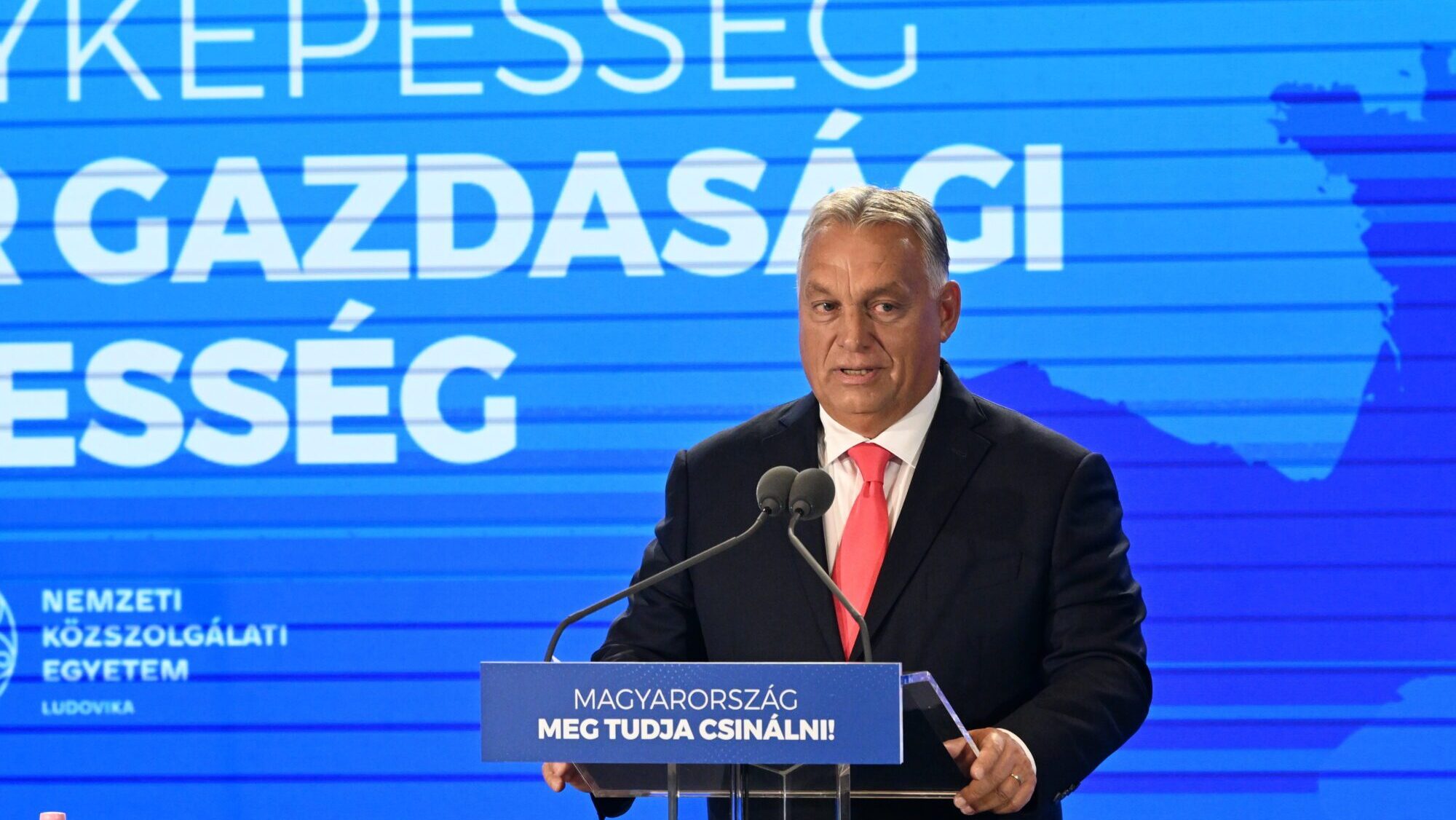
Hungarian Prime Minister Viktor Orbán delivers a speech at the National University of Public Service (NKE) conference on September 25, 2024.
Photo: Szilárd Koszticsák / MTI
European competitiveness and Hungarian economic neutrality were the two main topics when Hungarian Prime Minister Viktor Orbán held a guest lecture at Ludovika University in Budapest on Wednesday.
“Hungary has taken over the rotating presidency of the EU Council in uniquely hard times,” Orbán said. Competitiveness has been at the center of the agenda of the Hungarian presidency, as Minister for EU Affairs János Bóka and his team of experts identified the decrease in competitiveness as the number one issue for the European Union today.
A ‘Competitiveness Pact’ is expected to be signed by EU leaders in Budapest in early November, he revealed, without going into detail on what that pact will entail.
Internal communication within the EU, however, tends to shy away from talking about negative trends and problems, Orbán lamented, likening it to the old French Royal Courts: “Whoever talks in the nicest way about our common values and unity goes to the front of the line,” he said.
However, the recently released report by former President of the European Central Bank and former Prime Minister of Italy Mario Draghi has found that the economic growth of the EU bloc has been “constantly lower” than that of the United States in the past two decades; and that the forfeiture of cheap Russian gas imports in 2022 has cost the EU the total loss of its annual GDP growth. The report also found the EU’s share of global commerce is decreasing, among other damning facts about the current state of the European economy.
Many of the suggested solutions to the problems in the Draghi report match those of the Hungarian government, the PM said, without mentioning any specifics.
The balance in the global economy is shifting, Orbán noted:
It is clear that the momentum is in Asia. That’s where most of the money is, that’s where the biggest banks, biggest investment funds, the biggest corporations, and the biggest research centers are.
He criticized the Brussels and Washington leadership for trying to reverse these developments by forming economic blocs again, like during the Cold War. In response, Asian countries are working to create a non-dollar-based economic accounting system, which PM Orbán believes they will be able to achieve eventually.
“If that happens, we will have to operate in two separate financial systems,” he warned.
Some in the European leadership aim to position the EU on the American half of the new bipolar economic world order, according to Orbán. Others, such as President Macron of France, are advocating for ‘European strategic autonomy,’ which the PM defined as a strategy where “Europe is molding its relations to all other actors on the world economic stage based on its own interest.”
The latter approach is favorable to Hungarians, Orbán said. ‘Too bad that that won’t work either,’ he added facetiously.
The best course of action is strategic autonomy based on national—not federalist—interest, Orbán said; “I believe federalist Europe is a daydream that will suffer a serious shipwreck.”
Hungary has been implementing an ideology-free economic policy for years. …While the whole of Europe was trying to approach the problem of migration through an ideological lens, Hungary did not do so, but looked at the issue as it was, and said “We don’t want this.”…
The essence of economic neutrality is that if the global economy is divided into two, there still will be areas, let’s call them “overlap areas,” where the two economic systems meet. It was the case even in the wildest times of the Cold War, just think of Vienna. What economic neutrality means for Hungary is that we happen to be located in a place just like that.
Orbán concluded by saying that the most important thesis of economic neutrality is that Hungary decides who it does business with. Modernization, he said, is not only happening in the West anymore.
This article was originally published by The Hungarian Conservative and is reprinted with permission. It has been edited for length.
